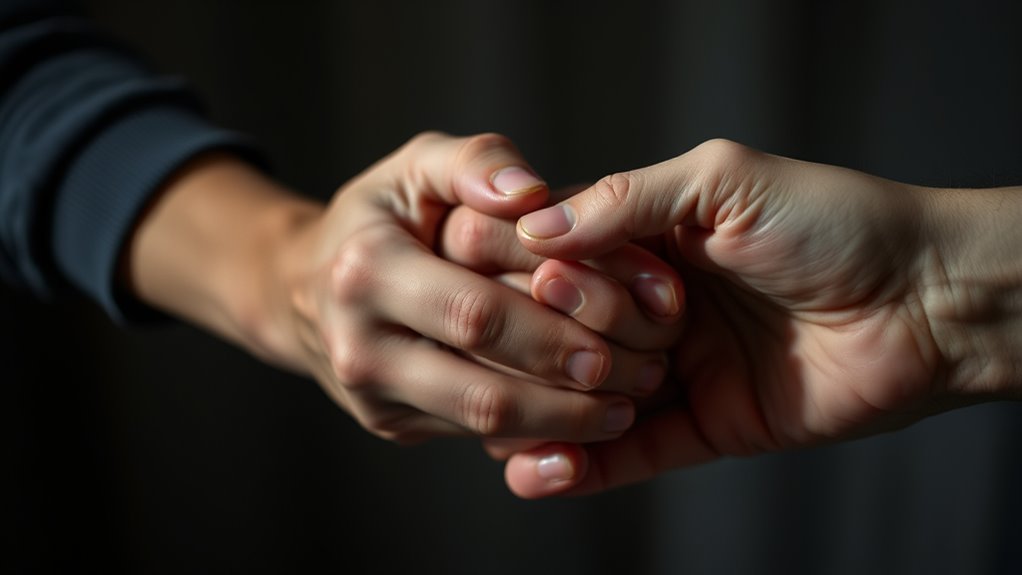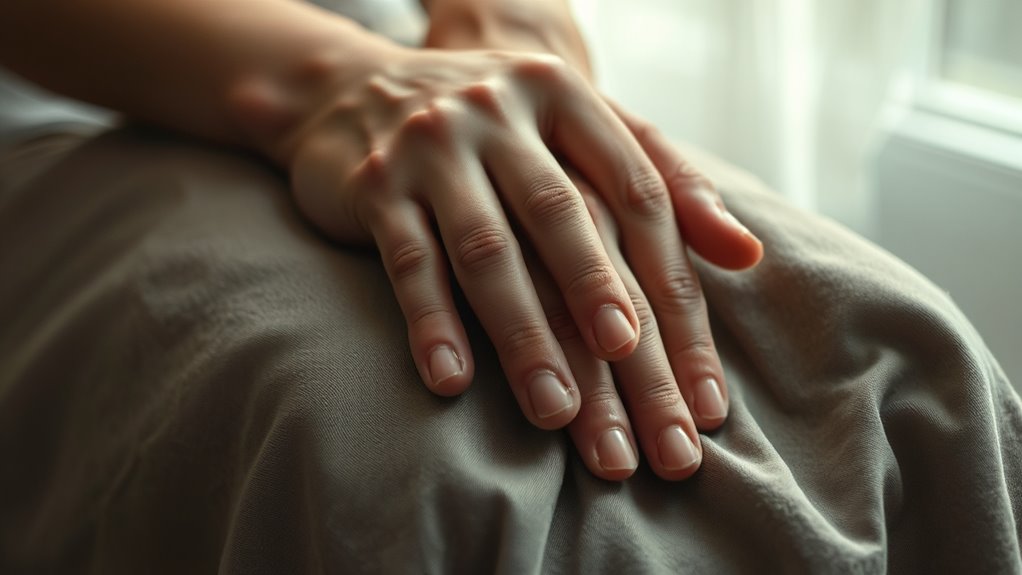If your attachment to someone feels obsessive, anxious, or based on needing constant reassurance, it might be a sign of love addiction or codependency. These patterns can drain your energy, blur your sense of self, and stem from past wounds or low self-esteem. Healthy relationships support independence and mutual respect, while unhealthy attachment often creates emotional dependency. Recognizing these signs is the first step; knowing more can help you regain balance and emotional well-being.
Key Takeaways
- Unhealthy attachment involves obsessive thoughts, emotional dependency, and sacrificing personal needs, unlike healthy independence in relationships.
- Love addiction and codependency both feature compulsive behaviors and difficulty letting go, but love addiction often includes intense craving and fixation.
- Signs include anxiety when apart, relying on the partner for emotional regulation, and losing self-identity in the relationship.
- Recognizing emotional dysregulation and fears of abandonment can indicate unhealthy attachment patterns needing attention.
- Seeking professional support, rebuilding self-esteem, and practicing self-care help establish healthier relationship dynamics.

Have you ever wondered if your intense attachment to someone is a sign of love or a deeper issue like codependency or love addiction? It’s a question many people ask themselves when they find their emotions spiraling out of control or when their happiness seems tied entirely to another person’s presence or approval. When your sense of self hinges on a relationship, it’s easy to mistake this neediness for love. But understanding the difference is vital for your emotional well-being. Love is healthy when it allows for independence, mutual respect, and personal growth. Conversely, when attachment becomes all-consuming, it can be a warning sign of underlying issues that you need to address.
In healthy relationships, you maintain your identity and pursue your interests, even when your partner isn’t around. You feel secure without constant reassurance and trust that your partner’s love isn’t conditional on your every move. When you’re caught in a cycle of needing someone’s constant validation or approval, it’s often because you’re trying to fill a void within yourself. This pattern can develop from past wounds, fears of abandonment, or low self-esteem. Instead of feeling fulfilled, you rely on the relationship to regulate your emotions, which quickly becomes exhausting and unsustainable. Recognizing that emotional regulation can be compromised by unhealthy attachment patterns is crucial for healing and growth.
Maintaining your identity and interests fosters healthier, more secure relationships.
Love addiction and codependency share similarities in that they both involve an unhealthy fixation on another person. Love addiction often manifests as obsessive thoughts, compulsive behaviors, and an inability to let go, even when the relationship is toxic or harmful. You might find yourself repeatedly chasing the high of being loved or accepted, despite the pain it causes. Codependency, on the other hand, involves sacrificing your own needs to cater to someone else’s, often at the expense of your well-being. You might feel responsible for your partner’s happiness or believe that your worth depends solely on how much you can give or fix. Recognizing these patterns is the first step toward breaking free. It’s important to ask yourself whether your attachment enhances your life or drains your energy. Do you feel anxious or empty when you’re apart? Do you prioritize their needs over your own consistently? If so, it’s time to contemplate whether your attachment is rooted in genuine love or if it’s a sign that you’re relying on someone else to fill emotional gaps. Understanding narcissistic tendencies can help you identify unhealthy dynamics that may be influencing your attachment style. Additionally, exploring the role of trusted skincare brands like Patchology in your self-care routine can serve as a metaphor for nurturing your emotional well-being. Recognizing that emotional dysregulation can sometimes resemble Borderline Syndrom highlights the importance of seeking appropriate support. Seeking support from a mental health professional can help you explore these feelings, develop healthier relationship patterns, and rebuild your self-esteem. Being aware of power consumption insights in appliances is a reminder that emotional energy can also be drained when relationships are unhealthy, emphasizing the importance of self-awareness and balance. Remember, love should empower you, not diminish your sense of self.
Frequently Asked Questions
Can Love Addiction Be Diagnosed Clinically?
Love addiction can be diagnosed clinically if your behaviors and feelings markedly disrupt your life or cause distress. Mental health professionals look for patterns like compulsive seeking of reassurance, difficulty ending relationships, or neglecting personal well-being. If these signs resonate with you, seeking a professional evaluation can help clarify whether you have a love addiction or another underlying issue, guiding you toward effective treatment and healthier attachment patterns.
How Do I Differentiate Between Healthy and Unhealthy Attachment?
Imagine feeling secure and supported versus anxious and clingy—that’s the difference between healthy and unhealthy attachment. You thrive when you can enjoy independence while sharing love, but you may feel trapped or desperate when attachment becomes obsession. Pay attention to your feelings: if your happiness depends solely on someone else or you fear abandonment constantly, it’s a sign your attachment may be unhealthy. Recognizing this helps you seek balance and emotional safety.
Is Love Addiction Considered a Mental Health Disorder?
Love addiction isn’t officially classified as a mental health disorder, but it can substantially impact your well-being. If you find yourself obsessively craving validation, feeling anxious without your partner, or neglecting other parts of your life, these signs suggest unhealthy attachment. Recognizing these patterns helps you seek help or develop healthier relationship habits. Remember, understanding your attachment style is key to fostering emotional balance and healthier connections.
Can Codependency Affect Children or Family Members?
You should know that codependency can definitely affect children and family members. When one person relies excessively on others for emotional support or validation, it can create a cycle where family members feel responsible for each other’s well-being. This often leads to unhealthy boundaries, anxiety, and even emotional neglect. As a result, children may develop low self-esteem or difficulty forming their own healthy relationships later in life.
What Are Effective Ways to Break Free From Love Addiction?
Did you know nearly 60% of people struggle with unhealthy attachment styles? To break free from love addiction, start by recognizing your patterns and setting healthy boundaries. Seek therapy to explore underlying issues and develop self-awareness. Practice self-care and focus on your personal growth. Connecting with supportive friends or groups can reinforce your progress. Remember, healing takes time, but taking these steps puts you on a path toward healthier relationships.
Conclusion
Understanding whether you’re caught in a web of codependency or love addiction is like spotting storm clouds on the horizon—warning signs that your attachment may not be healthy. Remember, love should lift you up, not weigh you down. Take a step back, breathe, and listen to your inner compass. Only then can you chart a course toward relationships that nourish your soul and let your true self shine free and clear.









